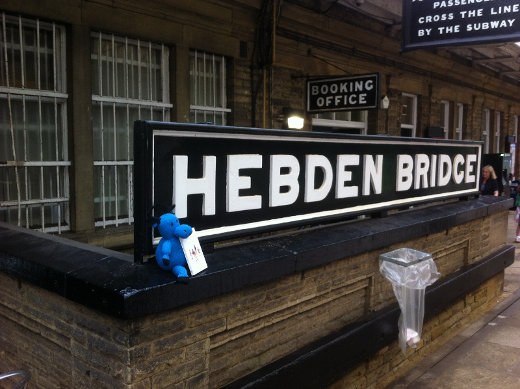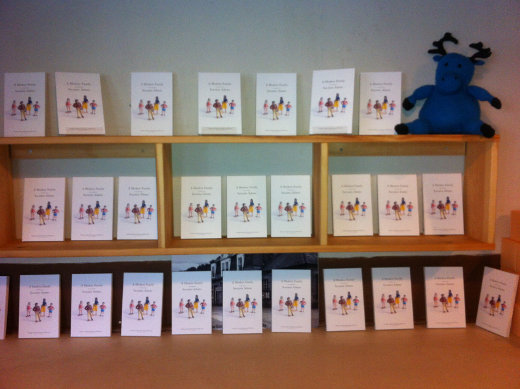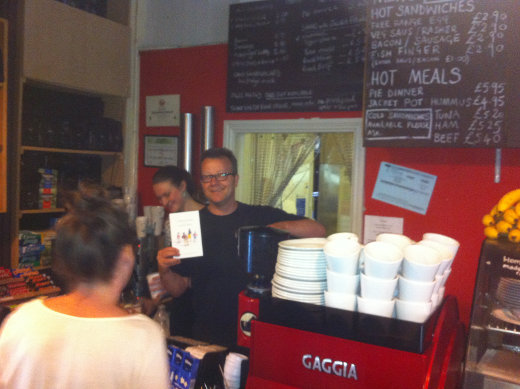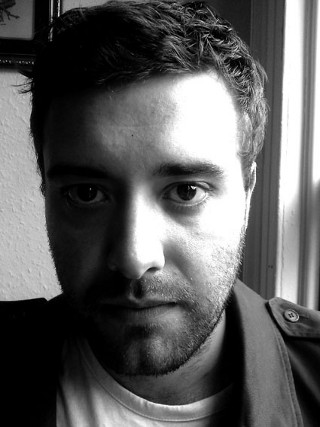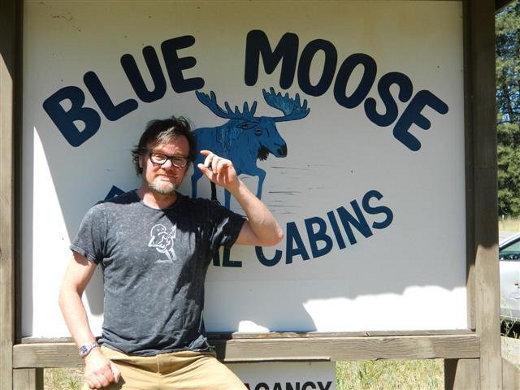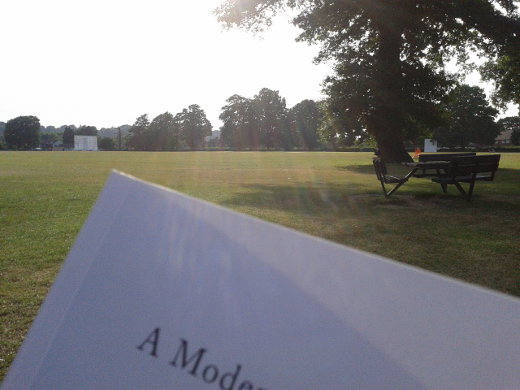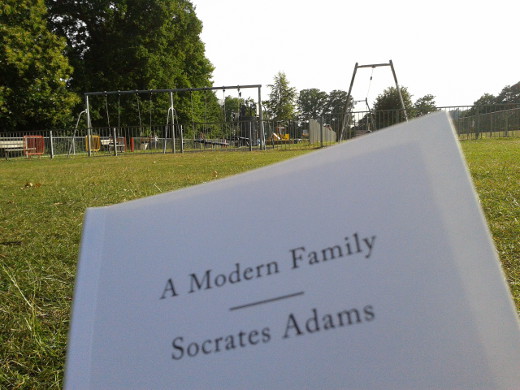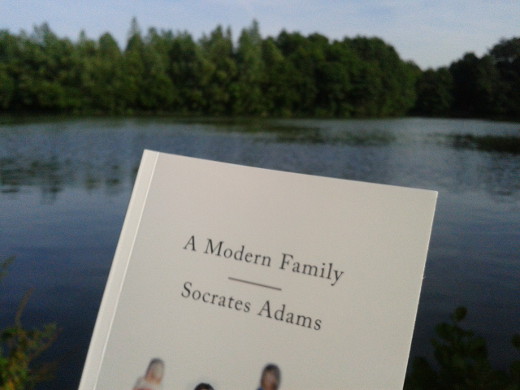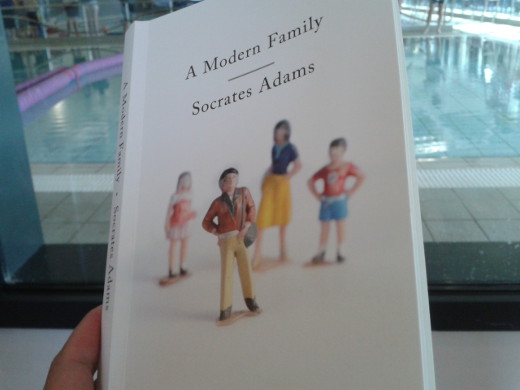The following is an excerpt from the brilliant new novel, A MODERN FAMILY, by Socrates Adams.
A television presenter drives around a town in England. He stops at red lights, beeps at inconsiderate drivers, correctly applies his brakes, accelerates efficiently, observes the highway code, considers suicide, steers, checks all three mirrors, starts, stops, moves. The television presenter imagines a handsome man driving a high-performance car down a road by an ocean in the sun. He doesn’t care about whether or not he is that man.
He imagines an ordinary man, driving a low-performance car down a road by a supermarket in bawling, growling rain. He doesn’t care about whether or not he is that man.
He drives past a Tesco’s. He drives past another supermarket. A small, sweet smelling cardboard pine tree dangles from his rearview mirror.
I need to get some shopping, he thinks. If he doesn’t get shopping from a supermarket, his children will die of starvation. He doesn’t want that to happen. He imagines his children playfully eating from steaming plates of food. He introduces his children to the audience of thirteen million, viewing at home. Time to shop, he thinks, happily.
He parks in a supermarket car park. Rain tracks down the windscreen. He grips the steering wheel a few times, happy that it yields slightly to the pressure. The dashboard of his car is a smiling face, helping him to express his emotions. He laughs to himself and feels fine. He takes the key out of the ignition.
A customer walks past the television presenter as he lopes through the shop entrance. The customer thinks, I recognise that man from the television. He looks worse in real life. He looks really awful in real life. The customer thinks briefly about asking for an autograph, but decides against it. A thick spray of water flies from the presenter’s head as he shakes his long, grey, locks. His scalp is visible through the hair, soaked to the skull. The customer goes about his business, getting into his car, driving home, and living the life of a customer.
Everything in the supermarket is covered in plastic. The presenter looks at the products on the shelves and thinks, I know what that is, or, what is that? He occasionally reaches out and touches something. Touching items in the supermarket provokes a melancholic surge which he cannot understand. He thinks, I am nothing, and goes on with his shopping. The aisles in the supermarket are badly organised. There’s an aisle of cheap children’s toys wedged between the meat and the dairy. The customers of the supermarket often think as they wander around, where is the item I’m looking for? The television presenter doesn’t think this. His brain simply engages ‘supermarket mode’. He walks up and down the aisles, basket in hand, feigning deep, passionate interest in products he sees; picking them up and setting them down at random with a sage look on his face, the look of a master chef, selecting the ingredients for a prize-winning banquet.
I Am Nothing, is the television presenter’s default setting. He is so good at thinking it, there’s nearly no effort whatsoever. He sometimes just feels that I Am Nothing is a kind of background radiation, an after effect of the big bang, like white noise on a television set. He thinks that without I Am Nothing there would be nothing. And that is major-league bull-shit, he thinks.
The television presenter first started thinking about things in terms of a type of league and some kind of shit a few years ago. One of his co-presenters had said ‘that is major-league bull-crap’ and he had found it very funny. He sometimes says, ‘minorleague horse-crap,’ or ‘ultra-league crab-crap.’ He just loves it.
What to make, what to make, what to make.
The great thing about food is that it is tasty, if you prepare it properly and make it from ingredients that you love to taste, says the presenter, to an audience of twelve and a half million at home. The presenter’s hands finally alight on some pickled whelks and Irish soda bread. He cannot decide whether or not the children will like this for dinner. He thinks about buying more pickled things to match up with the whelks.
Once, the television presenter had presented a television programme from the sea-side. He remembers the smell of the sea very vividly. He thinks that whelks, and other pickled fish are like the sea-in-a-tin. He takes his purchases to a counter. The cashier swipes his choices across the bar-code reader. The presenter is waiting for the cashier to mention something about his left-field choices. Maybe he’ll say something about how refreshing whelks are. Something about how the sour, complex notes of soda bread make it more interesting than standard, yeast-risen loaves. The cashier aggressively clears his throat, coughs painfully, wipes sweat from his forehead, hits his chest with a fist, and then whispers, almost imperceptibly, three pounds forty three.
It takes the presenter four minutes to start his car. The rain has stopped. He turns on an uplifting CD of music from his youth.
On his drive home the presenter stops at some traffic lights. There is a lady at the traffic lights. He looks at the lady’s buttocks. He turns up the music from his youth. He looks very hard at the lady’s buttocks. He turns up the music so that it is very loud. He loves looking at the lady’s buttocks. The lady’s buttocks are his best friend. He looks at the lady’s face. She is not looking at him. He turns the music up so that it is very, very loud. He opens the window of the car. The lady still looks away from him. He starts screaming along to the lyrics of the music. He screams and screams and finally the lady looks at him.
She sees an old man, beating his head in time to the music, screaming incoherently, opening and closing his window, being beeped at by other motorists. His eyes are wide open. He has long matted hair. She looks away.
A Modern Family will be published on July 25th.

